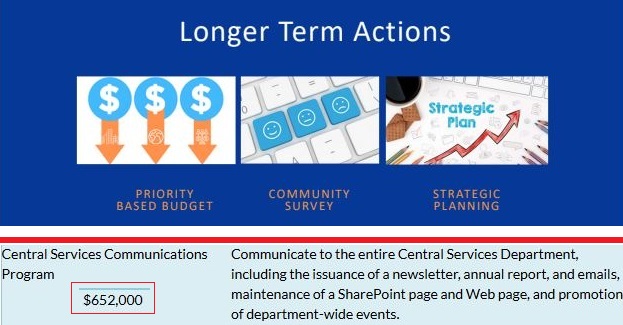City manager: Priority-based budget was never prioritized
8 min read
Presenter: The city manager admits Eugene’s priority-based budget has never been prioritized. And one commissioner warns that the city is trying to take funding away from Lane County. This story starts with the Budget Committee meeting Dec. 7, 2022. Explaining the city’s new priority-based budget system, Eugene City Manager Sarah Medary:
[00:00:21] City Manager Sarah Medary (Dec. 7, 2022): We’ve been talking about shifting to a priority-based budget. Last year, we almost brought a status quo budget last year because we knew that we needed to have our staff work completely on transforming our system.
[00:00:36] And so the priority-based budget system was really intended to shift us into a programmatic-based budget where we could really understand: What are the services we’re providing? And what are all the true costs associated with them?
[00:00:51] So we can start to understand what it looks like to scale ’em up, scale ’em back. What are potential opportunities, you know, program by program by program as opposed to, you know, this is in the Police, this is the Police Department budget, or this is the Central Services Department. So we’ve been working really hard on that…
[00:01:08] The other thing we’re doing related to priority-based budget is the program allows for what they call program insights, which is really a way to go in program by program and evaluate, you know: What are potential revenue opportunities? What are potential partnership opportunities? Are there efficiencies? How could you scale this? Can it be scaled? And we invited people to give us what, you know, basically their ideas.
[00:01:36] They call it—the ResourceX platform calls it an ‘insight,’ but it’s basically like: What are all of your ideas for how we could be saving money? What are your ideas about what we could stop doing?
[00:01:47] Presenter: Two years after that budget meeting, the council asked to use that information to set priorities. In an interview Dec. 10, Councilor Randy Groves:
[00:01:58] Councilor Randy Groves (Dec. 10, 2024): We have to have a way of prioritizing what we need right now to survive as a community. What legal requirements do we have to meet and then start working our way up? And I think it’ll point us in the direction.
[00:02:12] And I think it’s good to challenge the status quo from time to time, otherwise you just get in a rut. And as long as we are in these positions, it’s important that we challenge ourselves and challenge the system. And I think this prioritization process would be one way of getting at that.
[00:02:32] Presenter: A month after Councilor Groves made that request, on Jan. 15, 2025, City Manager Sarah Medary:
[00:02:39] City Manager Sarah Medary (Jan. 15, 2025): Council could have a priority-setting workshop at any time of the calendar year. You could do it in the middle of the biennium. You could do anytime. It’s just happening that it’s happening now at the exact same time we’re trying to finalize our budget to be able to get that into the system.
[00:02:54] And we can talk more about that later but I think the pressure and urgency of getting the budget done makes this conversation a little bit more challenging and makes it feel more compressed than would ideally be.
[00:03:07] And also before I give it to you, I want to say I know there’s a lot of city staff that are paying attention to this and a lot of community groups that are nervous and I hold their nervousness and respect as we start talking about prioritization, what that could mean for folks and just know that that kind of hangs over me and over this conversation.
[00:03:31] I think the piece that’s also important to remember is we’ve been doing service improvement / process improvement on our budget over the last several years. We started off with a very incremental annual, what I would call somewhat reactive budget process to shifting to program-based budget. It’s, the company that we were working for is actually called priority-based budgeting. We, but it does it through programs and so really until you set the priorities, I’m going to continue to call it a program-based budget.
[00:04:04] But that’s why we have the materials that we have and that you had in your packet that really allow us to understand even across departments where we’re spending money in specific programs and people really understand what they’re getting with their dollars.
[00:04:16] Presenter: So perhaps the city can explain what we’re getting for $652,000, as shown on the budget website, for one department to communicate with its own employees, including an annual report and quote, promotion of department-wide events.
[00:04:32] When we asked about the priority-based budget information published on the website, here’s how the city responded:
[00:04:39] City of Eugene email: …[O]ur PBB program data in the budget… is a look at our current budget organized by program, not necessarily the amount specifically budgeted to that program. An important distinction to note.
[00:04:51] Presenter: We think the city said its published budget data is not accurate. So we asked: How much are taxpayers giving the city to promote internal events for one department? That information is not available, and staff will have to spend some time and money to figure it out—because nobody at the city ever asked before.
[00:05:09] One county commissioner said Eugene is trying to take money away from Lane County. With background Jan. 6, Sheriff Clifton Harrold:
[00:05:18] Clifton Harrold (Lane County, sheriff, Jan. 6, 2025): We still have significant challenges at the Lane County Sheriff’s Office and frankly our biggest challenge is one that’s been around for 40 years and we don’t have time to get into it this morning. But we once were funded well with timber revenue and we no longer are.
[00:05:31] We’re so thankful for the community support of the levy that funds our jail function. But our patrol function is significantly under resourced. And when I say significantly, I mean that we have 30 (three-zero) fewer deputy sheriffs today than we had in 1979 to patrol unincorporated Lane County. And the population of Lane County has increased well over 100,000 people since then, so that’s a significant challenge.
[00:05:55] Presenter: Speaking Jan. 15 on the decline in timber revenue over the years, Commissioner Pat Farr:
[00:06:02] Commissioner Pat Farr (Jan. 15, 2025): If you look at the corner of this building over here, there are three county commissioners that paid cash for this building. Wrote a check for building this building… In those days, you could write cash, write checks because of the funding that we had.
[00:06:14] And we all know and we all see every year that the funding has diminished through federal payment payments and other resources that we historically have had.
[00:06:22] But historically thinking, as we in our different departments ask for more of what we have based upon what we had, putting in perspective of the percentages that we have based upon what we actually have.
[00:06:34] And I think that one thing we do lose track of quite often is the fact that we are the primary care for how many? Close to 30,000 people in Lane County rely on Lane County primary care.
[00:06:48] And the other thing that you pointed out, Steve, is that we are an arm of the state government. We rely more on state and federal funding than the cities do.
[00:06:56] I hope city councilors are listening right now and understanding that when they ask for money to supplant money that has been historically paid to counties, if they ask for it to go directly to cities, they’re taking away what is our general source of money and adding to what has not been their general source of money.
[00:07:13] So as we go into the legislative session, Steve, that’s one thing that we’d have to pay attention to is making certain that we protect what has historically come to counties.
[00:07:20] In the Association of Oregon Counties, legislative priorities number one is ‘sustain and protect the property tax asset to the benefit of all property owners and taxing districts’ through etc.
[00:07:29] Presenter: Commissioner Farr said Lane County leads the state in addressing the governor’s priorities.
[00:07:35] Commissioner Pat Farr (Jan. 15, 2025): The governor’s three priorities remain intact, and Lane County has been and is well-positioned to work with the governor in her three main priorities, something that we’ve done. In fact, we’ve more or less led the way on all 36 Oregon counties. We’ve been the leading county in addressing the governor’s priorities. So we’re looking forward to that and our team remains intact and our committees remain intact.
[00:07:58] So I believe that supporting what Gov. Kotek has put forward as her priorities is something that we’re well-prepared to do.
[00:08:05] Presenter: Instead of competing for limited funding, the city could instead cooperate with Springfield and Lane County. On Jan. 15, Eugene City Councilor Greg Evans:
[00:08:15] Councilor Greg Evans (Jan. 15, 2025): Three things, very quickly:
[00:08:17] One, I would like to see a proposal or what the proposal is in terms of how we are looking at the consolidation of service delivery. What are we doing about trying to save money and resources in terms of how we deliver services? That’s one piece.
[00:08:37] The second piece is: How close are we to landing ourselves with the proposed fire merger? That’s one of the cost savings that we identified a long time ago, and this conversation has been going on for a long time. And I know that Councilor Clark and other councilors are, you know, have been after this for a while, but I want to know where we are on that.
[00:09:03] And then finally, I think not for this conversation and discussion but at some point we’re going to have to have a broader discussion about our CIP budget and what we are doing with that.
[00:09:17] Presenter: Councilor Mike Clark:
[00:09:18] Councilor Mike Clark (Jan. 15, 2025): For my colleagues in favor of moving forward with the fire fee, I would say that my greatest concern with that is that we’re looking at a potential EWEB increase to the cost of electricity and the cost of water provision that will be a significant addition with this, enough to the community that I think we would face an election with someone getting sufficient petitions for votes reversing our decision. If we decide to move forward with a new fee, I think that would take place and happen in the community.
[00:10:00] If we go across-the-board cuts (which I won’t vote in favor of), that would mean closing a fire station and that will result in people’s houses being at risk.
[00:10:09] Presenter: One county commissioner warns: Eugene wants to take money away from Lane County. The city manager admits the priority-based budget was never prioritized. City staff says there are two sets of books, as the published numbers are ‘not necessarily the amount specifically budgeted to that program.’ And one city councilor asks about consolidation, a way to cut costs without losing service. The next city budget session is scheduled for Jan. 22.
UPDATE (Jan. 26, 2025): Add link to Lane County budget kickoff meeting, starting with the cited comments. This story did not include the commissioner names listed during the meeting because that list was not correct; Commissioner Peter DeFazio served on a five-member commission from 1983-1986, and the Public Service Building was constructed at the end of the three-member era.






